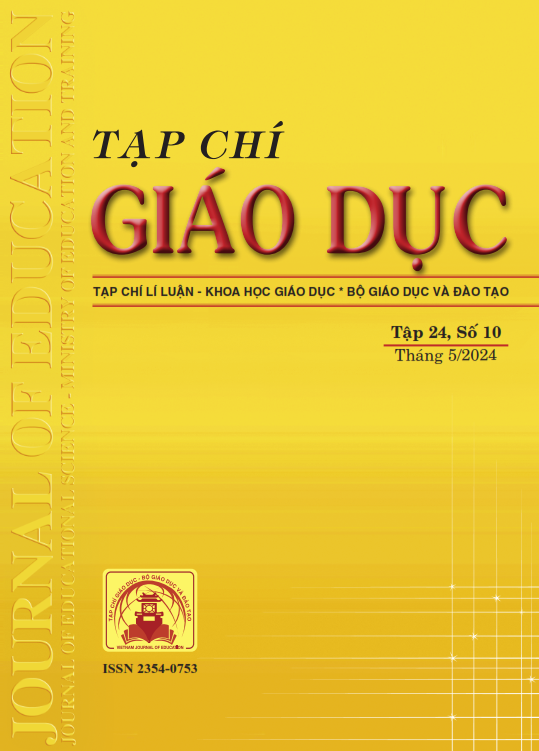Nghiên cứu ảnh hưởng của văn hoá tổ chức, lãnh đạo chuyển đổi đến lợi thế cạnh tranh trong các trường đại học Việt Nam
Tóm tắt
In the flow of international integration, Vietnamese universities need to create their own innovations and characteristics to adapt and develop. This requires the university to have a transparent and effective vision in planning strategies for development, building organizational culture and managing changes, keeping up with current developments and trends in university education today. The article proposes three research hypotheses to evaluate the influence of organizational culture and transformational leadership on the competitive advantages of universities. Using quantitative methods, the authors conducted a survey using Google form with a structured questionnaire with a 5-point Likert scale with a research sample of 281 people, who are university’s managers and employees in Hanoi and Ho Chi Minh City. The research results show that there is a positive impact from organizational culture and transformational leadership on a university's competitive advantages, and organizational culture has a positive impact on transformational leadership. Drawing on the findings, the article makes a number of suitable recommendations for universities in building and developing organizational culture and transformational leadership such as creating meaningful values, effectively communicating with employees, and paying more attention to recognition in organization.
Tài liệu tham khảo
Alessa, S. G. (2021). The dimensions of transformational leadership and its organizational effects in public universities in Saudi Arabia: A systematic review. Frontiers in Psychology, 12, 682092. https://doi.org/10.3389/ fpsyg.2021.682092
Alhshedi, A., Bardai, B. & Al-Dubai, M. (2020). The effect of transformational leadership behavior on organizational performance in gold industry of Saudi Arabia. Journal of Process Management and New Technologies, 8(3), 62-81. https://doi.org/10.5937/jouproman8-27033
Anning-Dorson, T. (2021). Organizational culture and leadership as antecedents to organizational flexibility: implications for SME competitiveness. Journal of Entrepreneurship in Emerging Economies, 13(5), 1309-1325. https://doi.org/10.1108/JEEE-08-2020-0288
Arokiasamy, A. R. A. & Tamah, A. (2021). A study on shaping academic leadership in Thailand’s Public Universities: The role of legislation and organizational culture. International Journal of Educational Administration, Management, and Leadership, 2(1), 5-14.
Azeem, M., Ahmed, M., Haider, S. & Sajjad, M. (2021). Expanding competitive advantage through organizational culture, knowledge sharing and organizational innovation. Technology in Society, 66, 101635. https://doi.org/10.1016/j.techsoc.2021.101635
Cameron, K. S. & Quinn, R. E. (2011.) Diagnosing and Changing Organizational Culture, Based on the Competing Values Framework (3rd edition). Jossey-Bass.
Fornell, C., & Larcker, D. F. (1981). Evaluating structural equation models with unobservable variables and measurement error. Journal of Marketing Research, 18(1), 39-50. https://doi.org/10.1177/002224378101800104
Hair Jr, J., Hair Jr, J. F., Hult, G. T. M., Ringle, C. M. & Sarstedt, M. (2021.) A primer on partial least squares structural equation modeling (PLS-SEM). Sage publications.
Henseler, J., Ringle, C. M. & Sarstedt, M. (2015). A new criterion for assessing discriminant validity in variance-based structural equation modeling. Journal of the Academy of Marketing Science, 43, 115-135.
Hill, C. W. L., Jones, G. R. & Schilling, M. A. (2014.) Strategic Management: Theory & Cases: An Integrated Approach. Cengage Learning.
Hossain, M. S., Hussain, K., Kannan, S., & Kunju Raman Nair, S. K. (2022). Determinants of sustainable competitive advantage from resource-based view: implications for hotel industry. Journal of Hospitality and Tourism Insights, 5(1), 79-98. https://doi.org/10.1108/JHTI-08-2020-0152
Jain, P., Duggal, T., & Ansari, A. H. (2019). Examining the mediating effect of trust and psychological well-being on transformational leadership and organizational commitment. Benchmarking: An International Journal, 26(5), 1517-1532. https://doi.org/10.1108/BIJ-07-2018-0191
Lê Văn Hảo (2018). Phát triển văn hoá trường đại học phù hợp với yêu cầu của Bộ tiêu chuẩn đánh giá chất lượng cơ sở giáo dục đại học 2017 của Bộ Giáo dục và Đào tạo. Tạp chí Khoa học, Trường Đại học Sư phạm Thành phố Hồ Chí Minh, 15(10), 17-27.
Nguyễn Huy Phòng (2023). Nâng cao chất lượng giáo dục đại học ở nước ta hiện nay. Tạp chí Tuyên giáo, Ban Tuyên giáo Trung ương. https://tuyengiao.vn/nang-cao-chat-luong-giao-duc-dai-hoc-o-nuoc-ta-hien-nay-148312
Nguyễn Viết Lộc (2009). Văn hóa tổ chức Đại học Quốc gia Hà Nội trong bối cảnh mới và hội nhập. Tạp chí Khoa học, Đại học Quốc gia Hà Nội, 25(4), 230-238.
Purwanto, A., Purba, J. T., Bernarto, I. & Sijabat, R. (2021). Effect of transformational leadership, job satisfaction, and organizational commitments on organizational citizenship behavior. Inovbiz: Jurnal Inovasi Bisnis, 9, 61-69.
Sekaran, U. & Bougie, R. (2016.) Research methods for business: A skill building approach. John Wiley & Sons.
Syakur, A., Susilo, T. A. B., Wike, W. & Ahmadi, R. (2020). Sustainability of communication, organizational culture, cooperation, trust and leadership style for lecturer commitments in higher education. Budapest International Research and Critics Institute (BIRCI-Journal): Humanities and Social Sciences, 3, 1325-1335. https://doi.org/10.33258/birci.v3i2.980
Tan, B. S. (2019). In search of the link between organizational culture and performance: A review from the conclusion validity perspective. Leadership & Organization Development Journal, 40(3), 356-368. https://doi.org/10.1108/LODJ-06-2018-0238
Wang, C. H. (2019). How organizational green culture influences green performance and competitive advantage: The mediating role of green innovation. Journal of Manufacturing Technology Management, 30(4), 666-683. https://doi.org/10.1108/JMTM-09-2018-0314
Zeb, A., Akbar, F., Hussain, K., Safi, A., Rabnawaz, M. & Zeb, F. (2021). The competing value framework model of organizational culture, innovation and performance. Business Process Management Journal, 27(2), 658-683. https://doi.org/10.1108/BPMJ-11-2019-0464
Tải xuống
Đã Xuất bản
Cách trích dẫn
Số
Chuyên mục
Giấy phép

Tác phẩm này được cấp phép theo Ghi nhận tác giả của Creative Commons Giấy phép quốc tế 4.0 .












